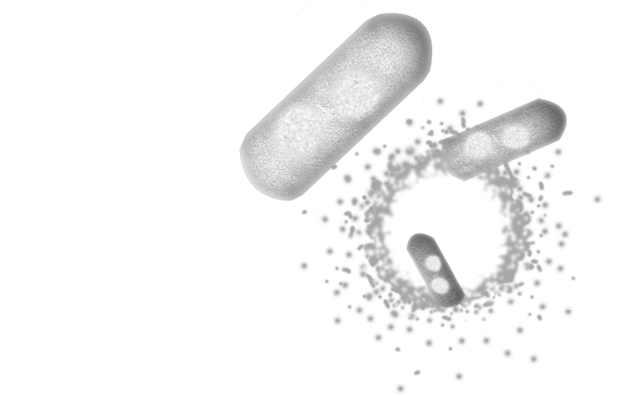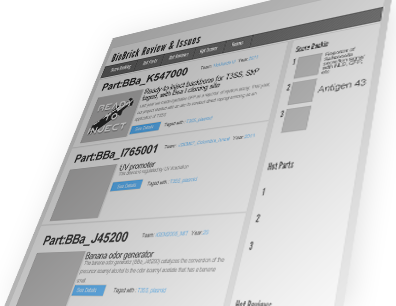Team:HokkaidoU Japan
From 2012.igem.org
| (33 intermediate revisions not shown) | |||
| Line 1: | Line 1: | ||
{{Team:HokkaidoU_Japan/header}} | {{Team:HokkaidoU_Japan/header}} | ||
| - | <div id="hokkaidou- | + | <html> |
| - | < | + | <h2><span class="mw-headline" id="Bio-capsule_E._coli">Bio-capsule E. coli</span></h2> |
| - | </div> | + | <h3><span class="mw-headline" id="Spherical_E._coli_cluster_that_can_accumulate_macromolecules_in_it"> |
| - | <div id="hokkaidou- | + | Spherical E. coli cluster that can accumulate macromolecules in it</span></h3> |
| - | < | + | <div class="hokkaidou-section" style="position: relative;"> |
| + | <div class="hokkaidou-index-article"> | ||
| + | <p> | ||
| + | We have designed two modules to make E. coli implementing the function as bio-capsules that accumulate bio-plastic. | ||
| + | </p> | ||
| + | <p id="hokkaidou-index-cross1"> | ||
| + | First module is to make bio-capsules formed by aggregation of E. coli through cell-cell interaction via adhesion molecule, Ag43, | ||
| + | located on the surface of outer membrane. The E. coli capsules can be easily collected by simple filtration without centrifuge steps. | ||
| + | Removal of centrifuge steps largely contributes for reduction of time-consuming steps in industrial production of valuable material in E. coli. | ||
| + | </p> | ||
| + | <p id="hokkaidou-index-cross2"> | ||
| + | Second module is for producing bio-plastic (poly-3-hydroxybutyrate, P3HB). PHB is produced by microorganisms (like Ralstonia eutrophus). | ||
| + | The polymer is primarily a product of carbon assimilation from glucose and is important for microorganisms as an energy storage molecule. | ||
| + | Development of a cost-effective method for manufacturing biodegradable plastic is one of important issue for making sustainable future society. | ||
| + | We have optimized culture conditions for efficient production of E. coli bio-capsules and efficient production of P3HB | ||
| + | (first success of bio-plastic production as iGEM team). Then we will try to extend the applicability of this system for | ||
| + | producing other high-value added macromolecules in the capsule. | ||
| + | </p> | ||
| + | </div> | ||
| + | <div class="hokkaidou-index-image hokkaidou-index-image-cross1 hokkaidou-index-image-cross2" id="hokkaidou-index-wet1" style="position: absolute; top: 60px; right: 0;"> | ||
| + | <img src="/wiki/images/7/7f/HokkaidoU2012_Biocapsule_1.png" /> | ||
| + | </div> | ||
| + | <div class="hokkaidou-index-image hokkaidou-index-image-cross1" id="hokkaidou-index-wet2" style="position: absolute; top: 95px; right: 5px; display: none;"> | ||
| + | <img src="/wiki/images/b/ba/HokkaidoU2012_Biocapsule_2.png" /> | ||
| + | </div> | ||
| + | <div class="hokkaidou-index-image hokkaidou-index-image-cross2" id="hokkaidou-index-wet3" style="position: absolute; top: 100px; right: 45px; display: none;"> | ||
| + | <img src="/wiki/images/0/07/HokkaidoU2012_Biocapsule_3.png" /> | ||
| + | </div> | ||
| + | <a href="/Team:HokkaidoU_Japan/Project" style="position: absolute; right: 25px; bottom: 25px"> | ||
| + | <img src="https://static.igem.org/mediawiki/2012/d/d8/HokkaidoU2012_Learn_More.png" /> | ||
| + | </a> | ||
| + | </div> | ||
| - | == | + | <h2 style="text-align: right;"><span class="mw-headline" id="Biobrick_Reviews">Biobrick Reviews</span></h2> |
| - | + | <div class="hokkaidou-section" style="position: relative";> | |
| - | == | + | <div class="hokkaidou-index-image"> |
| - | + | <img src="/wiki/images/d/d7/Hokkaidou2012_Index_Human_Practice.png" alt="human practice" /> | |
| - | + | </div> | |
| - | + | <div class="hokkaidou-index-article" style="float: right"> | |
| - | + | As a Human Practice project, we are developing a brand new bio-communication tool, named “Biobrick Reviews”. | |
| - | + | Through this site, everyone can introduce their favorite bio-devices with a short comment for recommendation. | |
| - | As a Human Practice project | + | And everyone including iGEMers can throw a vote to their favorite biobricks. |
| - | + | The goal of this project is not to cover full information of every single biobrick. | |
| - | + | Our purpose is to provide a place where every iGEMer or researcher in the field of synthetic biology can find which biobrick is popular through participating this exiting ranking event. Let’s make a nice biobrick catalog together! | |
| - | + | </div> | |
| - | < | + | <a href="/Team:HokkaidoU_Japan/Human_Practice" style="position: absolute; right: 25px; bottom: 25px"> |
| - | </ | + | <img src="https://static.igem.org/mediawiki/2012/d/d8/HokkaidoU2012_Learn_More.png" /> |
| - | <br style="line-height: 0; clear: both;" /> | + | </a> |
| + | <br style="clear: both; line-height: 0;" /> | ||
| + | </div> | ||
| + | </html> | ||
| + | <br style="clear: both; line-height: 0;" /> | ||
{{Team:HokkaidoU_Japan/footer}} | {{Team:HokkaidoU_Japan/footer}} | ||
Latest revision as of 17:30, 26 September 2012
Bio-capsule E. coli
Spherical E. coli cluster that can accumulate macromolecules in it
We have designed two modules to make E. coli implementing the function as bio-capsules that accumulate bio-plastic.
First module is to make bio-capsules formed by aggregation of E. coli through cell-cell interaction via adhesion molecule, Ag43, located on the surface of outer membrane. The E. coli capsules can be easily collected by simple filtration without centrifuge steps. Removal of centrifuge steps largely contributes for reduction of time-consuming steps in industrial production of valuable material in E. coli.
Second module is for producing bio-plastic (poly-3-hydroxybutyrate, P3HB). PHB is produced by microorganisms (like Ralstonia eutrophus). The polymer is primarily a product of carbon assimilation from glucose and is important for microorganisms as an energy storage molecule. Development of a cost-effective method for manufacturing biodegradable plastic is one of important issue for making sustainable future society. We have optimized culture conditions for efficient production of E. coli bio-capsules and efficient production of P3HB (first success of bio-plastic production as iGEM team). Then we will try to extend the applicability of this system for producing other high-value added macromolecules in the capsule.


Biobrick Reviews


 "
"













